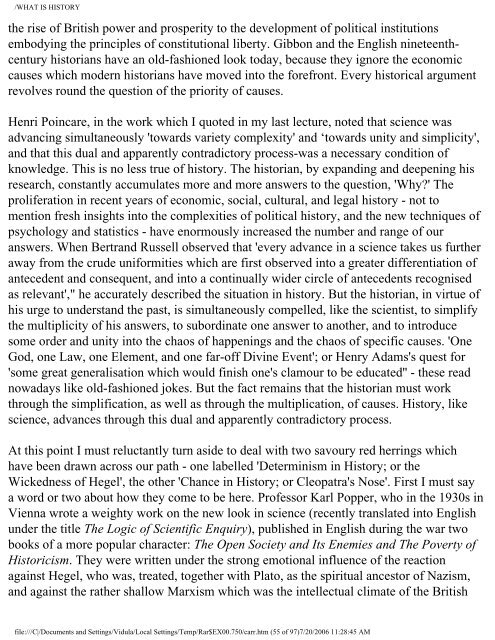What is History / by Edward Hallett Carr - Universal History Library
What is History / by Edward Hallett Carr - Universal History Library
What is History / by Edward Hallett Carr - Universal History Library
You also want an ePaper? Increase the reach of your titles
YUMPU automatically turns print PDFs into web optimized ePapers that Google loves.
WHAT IS HISTORY<br />
the r<strong>is</strong>e of Brit<strong>is</strong>h power and prosperity to the development of political institutions<br />
embodying the principles of constitutional liberty. Gibbon and the Engl<strong>is</strong>h nineteenthcentury<br />
h<strong>is</strong>torians have an old-fashioned look today, because they ignore the economic<br />
causes which modern h<strong>is</strong>torians have moved into the forefront. Every h<strong>is</strong>torical argument<br />
revolves round the question of the priority of causes.<br />
Henri Poincare, in the work which I quoted in my last lecture, noted that science was<br />
advancing simultaneously 'towards variety complexity' and ‘towards unity and simplicity',<br />
and that th<strong>is</strong> dual and apparently contradictory process-was a necessary condition of<br />
knowledge. Th<strong>is</strong> <strong>is</strong> no less true of h<strong>is</strong>tory. The h<strong>is</strong>torian, <strong>by</strong> expanding and deepening h<strong>is</strong><br />
research, constantly accumulates more and more answers to the question, 'Why?' The<br />
proliferation in recent years of economic, social, cultural, and legal h<strong>is</strong>tory - not to<br />
mention fresh insights into the complexities of political h<strong>is</strong>tory, and the new techniques of<br />
psychology and stat<strong>is</strong>tics - have enormously increased the number and range of our<br />
answers. When Bertrand Russell observed that 'every advance in a science takes us further<br />
away from the crude uniformities which are first observed into a greater differentiation of<br />
antecedent and consequent, and into a continually wider circle of antecedents recogn<strong>is</strong>ed<br />
as relevant'," he accurately described the situation in h<strong>is</strong>tory. But the h<strong>is</strong>torian, in virtue of<br />
h<strong>is</strong> urge to understand the past, <strong>is</strong> simultaneously compelled, like the scient<strong>is</strong>t, to simplify<br />
the multiplicity of h<strong>is</strong> answers, to subordinate one answer to another, and to introduce<br />
some order and unity into the chaos of happenings and the chaos of specific causes. 'One<br />
God, one Law, one Element, and one far-off Divine Event'; or Henry Adams's quest for<br />
'some great general<strong>is</strong>ation which would fin<strong>is</strong>h one's clamour to be educated'' - these read<br />
nowadays like old-fashioned jokes. But the fact remains that the h<strong>is</strong>torian must work<br />
through the simplification, as well as through the multiplication, of causes. H<strong>is</strong>tory, like<br />
science, advances through th<strong>is</strong> dual and apparently contradictory process.<br />
At th<strong>is</strong> point I must reluctantly turn aside to deal with two savoury red herrings which<br />
have been drawn across our path - one labelled 'Determin<strong>is</strong>m in H<strong>is</strong>tory; or the<br />
Wickedness of Hegel', the other 'Chance in H<strong>is</strong>tory; or Cleopatra's Nose'. First I must say<br />
a word or two about how they come to be here. Professor Karl Popper, who in the 1930s in<br />
Vienna wrote a weighty work on the new look in science (recently translated into Engl<strong>is</strong>h<br />
under the title The Logic of Scientific Enquiry), publ<strong>is</strong>hed in Engl<strong>is</strong>h during the war two<br />
books of a more popular character: The Open Society and Its Enemies and The Poverty of<br />
H<strong>is</strong>toric<strong>is</strong>m. They were written under the strong emotional influence of the reaction<br />
against Hegel, who was, treated, together with Plato, as the spiritual ancestor of Naz<strong>is</strong>m,<br />
and against the rather shallow Marx<strong>is</strong>m which was the intellectual climate of the Brit<strong>is</strong>h<br />
file:///C|/Documents and Settings/Vidula/Local Settings/Temp/Rar$EX00.750/carr.htm (55 of 97)7/20/2006 11:28:45 AM







